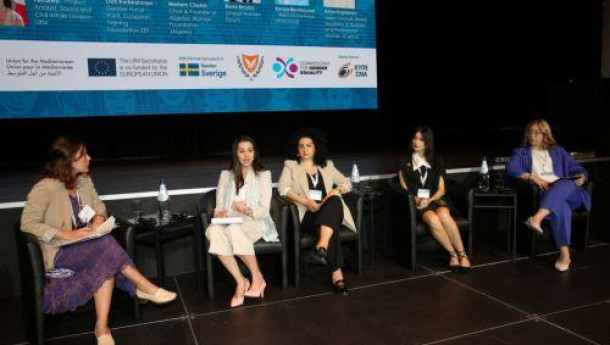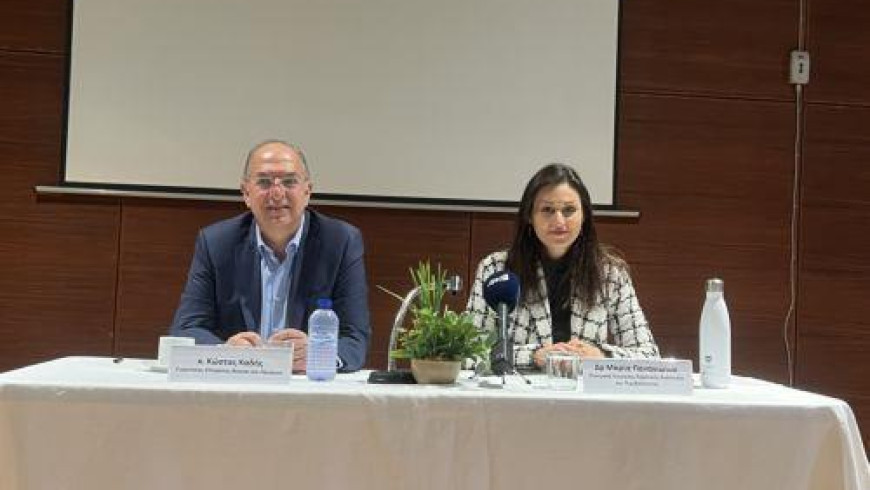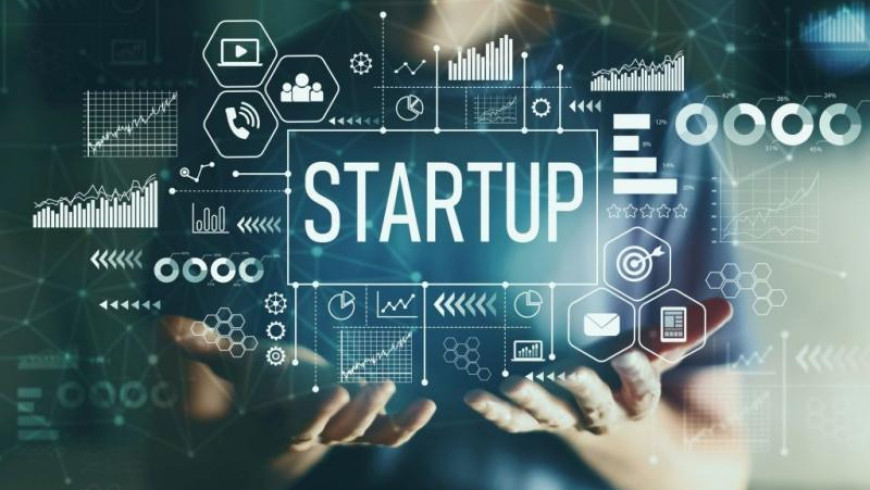
Gender Equality is not only a matter of justice, but a matter of sustainability, experts who participated in the deliberations of the "Women for the Mediterranean" Conference said on Friday. The Conference is co-organised by the Union for the Mediterranean and the Office of the Commissioner for Gender Equality in Cyprus. Cyprus News Agency is the media sponsor.
On the second day of the conference, women's access to justice, women's economic empowerment, female entrepreneurship and the impact of the climate crisis on women were discussed. In the afternoon, a panel discussion on violence against women and girls was set to take place. On Friday morning, the discussion focused on the challenges facing women in Mediterranean countries, with participants coming from Spain, Portugal, Morocco, Tunisia, Egypt, Algeria, Lebanon, Palestine and Cyprus.
The court system is a reflection of society
Clara Magahani, a Governance Public Sector Specialist at the World Bank Group, in her key note speech, spoke about women's access to justice. She stressed the importance of collecting data that takes gender issues into account in order to make policies to improve the situation.
Referring to her work in sub-Saharan Africa, she said that the World Bank's data collection was done through surveys, as there was no government data available. The numbers showed that the most significant barrier to women's access to justice was the high cost and lack of information about the legal system, noting that time, money and the complexity of the system prevented women from equal access to justice.
Noting that the court system is a reflection of society, she referred to the measures taken by the World Bank to improve the situation in Tanzania, based on the data collected. In particular, she said that a reduction in the number of days taken to hear family cases was achieved, as well as an increase in the number of women working in the judicial system and in leadership positions in the courts, while more women were trained.
Women economic empowerment and female entrepreneurship
In the first panel, on women economic empowerment, the speakers reiterated that the root of the problem of gender inequality in the labour market is social norms and stereotypes. The importance of work-life balance, which they said was seen by women as a more important problem than the gender pay gap, was stressed, while noting that the situation could be improved through public policy supporting working mothers, but also through technology, with flexible working arrangements and working from home.
Furthermore, the importance of education, with an emphasis on new technologies and the development of digital skills by women were stressed, in order to avoid increasing the gap between men and women in the field of technology, especially in the era of artificial intelligence.
"Imposter syndrome", the feeling of not belonging in a field when you have the qualifications and skills, is a phenomenon predominantly found among women who question their abilities, they added.
The solutions they proposed included gender equality education from an early age, access to financing, digital transformation of the education system, which can provide more employment opportunities for women in the future. In addition, the need to include men in the debate was also noted.
In a second panel, on female entrepreneurship, the limited access of women entrepreneurs to financing and investments was discussed. In particular, it was said that at EU level, only 1.8% of start-ups receiving investor funding are run by women. Financial illiteracy, limited networking, lack of self-confidence were presented as barriers to promoting female entrepreneurship.
The panel also included women involved in organisations that provide tools for the development of female entrepreneurship, who noted that they give visibility to these businesses to help them find investors. In addition, they said that it is important that the funding programmes that are announced are inclusive and based on the specific needs of women in each region, which is something that needs to be researched. In addition, these organisations provide technical advice and support, as well as tools for developing business plans and partnerships.
EU needs to change the way it sees the countries of the region
The EU needs to change the way it sees countries in the Middle East and North Africa region, experts said in the third panel of the day. In particular, they said that the EU is engaging with countries in the region on two pillars: migration and energy. As a result, other issues on which there could be cooperation, such as peace promotion, climate change and gender equality, are being neglected.
The third panel was on the impact of the climate crisis on gender equality in the Mediterranean. Participants said that in the Middle Eastern and North African countries, in the agricultural sector, more than 50% are women, who have been heavily affected by the climate crisis and are forced to abandon agriculture due to floods, droughts or other extreme weather events.
At the same time, they find it difficult to find work in other sectors, leading them to unemployment. They noted that although women are the majority in this sector, they are not taken into account in decision-making.
Moreover, they said that the climate crisis has also led to internal displacement and migration of women in the region. As panelists noted, this entails other risks for women, who are vulnerable to becoming victims of exploitation and trafficking. Still, it was noted that in cases where men migrate to find work, it is women who are left behind, often without the means to survive and shouldering the care of the family and household. It was reported that this has a negative effect on their mental health as well as a cultural effect, with girls being forced to drop out of school or forced to marry at an early age.














 3287.99
3287.99 1275.09
1275.09
